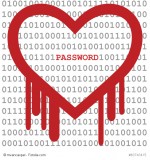You are viewing our site as an Agent, Switch Your View:
Agent | Broker Reset Filters to Default Back to List
Due to the ongoing situation with Covid-19, we are offering 3 months free on the agent monthly membership with coupon code: COVID-19A
UNLIMITED ACCESS
With an RE Technology membership you'll be able to view as many articles as you like, from any device that has a valid web browser.
Purchase AccountNOT INTERESTED?
RE Technology lets you freely read 5 pieces of content a Month. If you don't want to purchase an account then you'll be able to read new content again once next month rolls around. In the meantime feel free to continue looking around at what type of content we do publish, you'll be able sign up at any time if you later decide you want to be a member.
Browse the siteARE YOU ALREADY A MEMBER?
Sign into your accountHeartbleed: How to Make Sure Your Data is Safe—and Keep It That Way!
April 14 2014
This post comes to us from the Market Leader blog:
 You may have heard about the destructive security bug, "Heartbleed," that attacks a vulnerable flaw in major online security systems enabling it to access encrypted data. Warnings about Heartbleed are loud and alarming for good reason.
You may have heard about the destructive security bug, "Heartbleed," that attacks a vulnerable flaw in major online security systems enabling it to access encrypted data. Warnings about Heartbleed are loud and alarming for good reason.
Don't ignore the ever-increasing need for vigilance in protecting your data. The Heartbleed Bug launched about two years ago, and there's no way for you to know what may have been compromised by this vulnerability, including Web, email, instant messaging, and some virtual private networks.
So we encourage you to practice good security measures, like remembering to change your online passwords. (Yea, yea, we know—it's like hearing your dental hygienist reminding you to floss—but it's gotta be done!)
Here are some excellent tips on protecting yourself and/or your brokerage along with links to more technical details and helpful information to use with your sphere of influence.
What can you do to protect yourself from Heartbleed?
- Change your passwords every few months. Especially passwords on financial accounts (banking, credit cards, etc.) and any site you regularly shop on. Before going to the trouble of changing all 250+ of your passwords, take a peek at the great list Mashable.com put together to prioritize websites where you should consider changing your password.
- Be a little leery of public Wi-Fi networks. As suggested in NPR's blog post by Elise Hu and Steve Henn, limit your Internet behavior to non-transactional based or using websites that access financial information while on the Wi-Fi at Starbucks or other public places.









